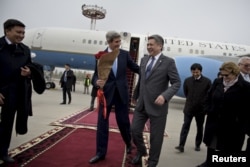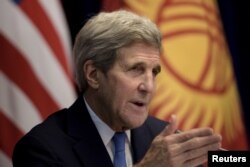U.N. Secretary-General Ban Ki-moon said Saturday that he welcomed international talks on Syria, but that they should not be hung up over what should happen to President Bashar al-Assad.
"The future of Syria or the future of all these peace talks and Syrian-led negotiations should not be held up by an issue of a future of one man," Ban said. "Basically, I believe it is up to Syrian people, who have to decide the future of President Assad."
But Ban said he was encouraged that the participants in Friday's talks in Vienna reached a mutual understanding on key issues, including the need to speed up diplomacy to end the fighting in Syria.
Delegates from 17 countries agreed on the need for talks between the Assad government and the Syrian opposition on a cease-fire and plans for democratic elections under U.N. supervision, while still fighting against terrorist groups.
But there was no agreement on Assad. The United States has said Assad is the cause of the bloodshed and any leader who used bombs and chemical weapons against his own people cannot be any part of Syria's future. Saudi Arabia and Turkey also want him gone.
Russia and Iran, Assad's two biggest allies, are directly involved in the fighting in Syria to prop up Assad's floundering regime.
No one from the Syrian government or the opposition was at the Vienna talks.
Kerry: US not entering war
Meanwhile, U.S. Secretary of State John Kerry said Saturday that President Barack Obama's decision to send special operations forces to Syria was focused on fighting Islamic State militants did not mean the United States was entering Syria's civil war.
Kerry, who commended Obama for the deployment, said U.S. policy was aimed clearly at defeating the extremists. He did not rule out further U.S. involvement in Syria, saying he could not predict the future.
The White House said the president authorized fewer than 50 members of special operations forces to go to northern Syria to help opposition groups fighting against Islamic State militants. They will be the first U.S. ground forces inside Syria, other than for a brief raid or specific mission, since the Syrian civil war began in early 2011.
A senior U.S. defense official said the U.S. troops would not carry out any unilateral raids or be involved in any joint action with Syrian forces. However, the senior official said she would not rule out the possibility of “adjusting” the role of U.S. forces in the future.
Kerry was in Bishkek, Kyrgyzstan, his first stop on a five-nation Central Asia tour that includes Uzbekistan, Kazakhstan, Tajikistan and Turkmenistan.
U.S. officials regard Kerry's visit as a way of assuring the Central Asian nations of the strength of their ties to Washington at a time when U.S.-Russian relations are on the decline. But he is also under pressure to speak out against the shortcomings of the Central Asian allies.
Senator Ben Cardin, a Maryland Democrat who is his party's ranking member on the U.S. Senate Foreign Relations Committee, sent a public letter to Kerry on Friday urging him to push for the release of political prisoners in each of the countries he visits. He asked Kerry to emphasize the strong U.S. commitment "to universally recognized democratic principles" as he met with each nation's foreign minister.
U.S.-based Human Rights Watch called on Kerry to express concern about the nations' rights records. It asked Kerry to press for the release of people wrongfully imprisoned, an end to impunity for torture, and the upholding of other key rights commitments.
The Committee to Protect Journalists recently urged Kerry to bring attention to the jailing of journalists for political reasons and online censorship, and to decry physical attacks on members of the media. CPJ said its research indicated media freedom had "steadily worsened" in Central Asia in the post-Soviet era.







